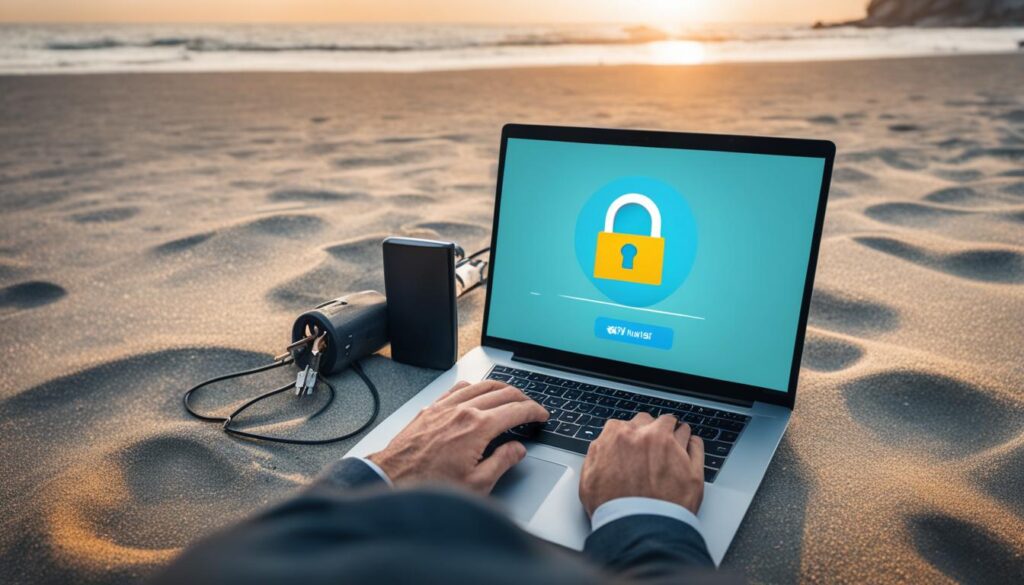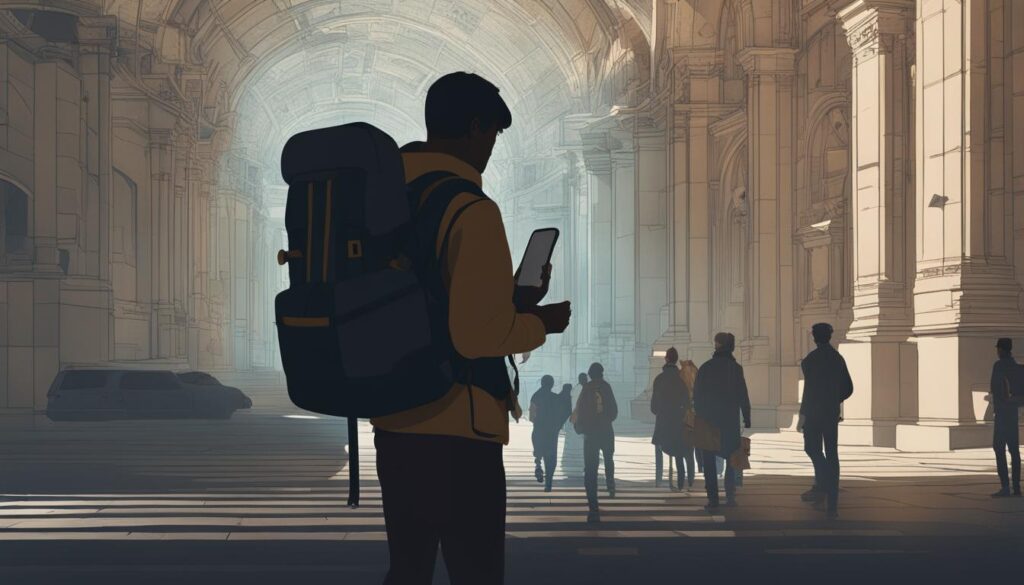When you’re traveling, whether for leisure or business, staying connected to the internet is essential. But while doing so, you might be putting your digital safety at risk without even realizing it. Protecting your personal information and maintaining secure online practices while on the go should be a top priority. In this comprehensive guide, we’ll share travel safety tips, cybersecurity for travelers, and online security measures to help you protect personal data while abroad. We’ll discuss how to secure internet access while traveling, how to browse safely while on the road, and how to protect your digital identity. We’ll also provide tips for securing online transactions while traveling.
By implementing the strategies and tips outlined in this guide, you can minimize the risks associated with carrying digital devices and protect your personal data while on the go. We’ll cover everything you need to know, so you can travel with confidence. Let’s get started!
Understanding the Risks of Traveling with Digital Devices
When it comes to traveling with digital devices, there are several risks that you should be aware of to ensure your digital safety while traveling. One of the most significant risks is the potential for theft. Losing a device while traveling can be stressful and inconvenient, but it can also put your personal data at a higher risk of being compromised if it falls into the wrong hands.
Another risk is the possibility of hacking and data breaches. Cybercriminals can use various tactics, such as phishing emails and malware, to gain unauthorized access to your devices and steal sensitive data, from passwords to financial information.
Fortunately, by being aware of these risks, you can take proactive measures to mitigate them and ensure a secure travel experience.
Tip: Always keep a backup of your important data. This can be a physical hard drive or using a cloud storage service. This way, even if your device is lost or stolen, you can still access your data from another device.
Securing Your Devices and Data
When traveling, it’s essential to secure your devices and data to protect your personal information. Follow these travel safety tips to safeguard your devices:
- Set strong passwords: Use unique, complex passwords for your devices and accounts. Avoid using the same password for multiple accounts.
- Enable encryption: Enable encryption on your devices to protect your data from hackers.
- Back up your data: Regularly back up your data to a secure cloud storage solution or an external hard drive. In case of loss or theft, you can easily restore your data.
- Secure online transactions: Use only reputable, secure websites when making online transactions. Avoid using public Wi-Fi for sensitive transactions, such as banking or shopping. Check that the website has a valid security certificate before entering any personal information.
By taking these steps, you can protect your personal data and ensure secure online transactions while traveling.
Choosing Secure Internet Connections
When traveling, finding a trustworthy internet connection can be challenging but it is crucial for digital safety while traveling. Whether it’s for personal browsing or conducting business, you need to ensure that your internet connection is secure to protect your personal information.
| Internet Connection | Pros | Cons |
|---|---|---|
| Mobile Data | Easy to set up and use | Relatively expensive compared to other options |
| Virtual Private Networks (VPNs) | Encrypts traffic, making it harder for hackers to intercept data | Can be slow and expensive for high-quality VPNs |
| Secure Public Wi-Fi Networks | Convenient and usually free | Can be risky and have weaker security |
Whichever option you select, it’s important to follow safe browsing practices to protect yourself from online threats. Here are some tips for safe browsing while on the road:
- Only visit reputable websites
- Be cautious of suspicious emails or messages
- Avoid downloading attachments from unknown sources
- Keep your browser and operating system up-to-date to ensure the latest security patches and updates are installed
- Use anti-virus and anti-malware software
The benefits of following these practices include avoiding phishing attempts, malware, and other online threats that can be harmful to digital safety while traveling. Remember to choose your internet connection wisely to ensure that your online activity remains secure during your travels.
Protecting Your Personal Information
Traveling can expose you to various risks, including the possibility of identity theft or unauthorized access to your sensitive information. With some basic precautions, you can keep your data safe and protect your privacy while on the go. Here are some effective strategies for safeguarding your personal information:
- Minimize the information you carry: Only carry essential documents that you need, such as your passport, visa, and credit cards. Leave other sensitive information, such as your Social Security card, at home.
- Use secure cloud storage solutions: Back up your data to a secure cloud storage solution, such as Dropbox or Google Drive, rather than relying on physical storage devices that can be lost or stolen.
- Be cautious when sharing sensitive information online: Avoid sharing sensitive information, such as your credit card details or Social Security number, over unsecured Wi-Fi networks or public computers. Use a VPN to encrypt your internet traffic and secure your online communications.
To learn more about securing your internet connections while traveling, check out the Choosing Secure Internet Connections section of this guide. Remember, protecting your personal information is crucial for safeguarding your digital safety while traveling.
And as a reminder, here’s an infographic that summarizes the key tips and strategies covered so far:
“Your personal information is valuable and should be protected at all times, especially when traveling.”
Securing Your Online Accounts
As you travel, securing your online accounts should be one of your top priorities to ensure digital safety while traveling. A compromised account can lead to identity theft, financial loss, and privacy violations. Therefore, it’s crucial to take extra measures to safeguard your online accounts.
The first step is to create strong, unique passwords for each of your accounts. Avoid using easily guessable passwords, such as your birth date or simple words. Instead, combine random words, numbers, and symbols to make a complex password that is hard to crack. Also, enable two-factor authentication for added security. This will require you to enter a unique verification code, usually sent via SMS or generated by an authenticator app, in addition to your regular password, making it almost impossible for someone to hack your account.
When traveling, it’s best to avoid using public computers or devices to access your accounts. If you must use them, remember to log out after each session and clear the browser’s cookies and cache. This minimizes the risk of your sensitive information being accessed by someone else. Additionally, be vigilant and monitor your accounts for any suspicious activity, such as unrecognized logins or unexpected transactions.

Protecting Your Digital Identity
Your digital identity plays a crucial role in your overall security when traveling. Protecting it can minimize your vulnerability to cyber threats. Below are some tips to help you safeguard your digital identity:
- Use privacy settings on social media: Adjust your social media privacy settings to control who can view your profile and posts. Limit the personal information you share online, such as your location, phone number, and email address.
- Avoid oversharing: Be mindful of what you post online, especially when it comes to sensitive information. Before sharing anything, ask yourself if it’s necessary and appropriate.
- Use discretion when connecting to public Wi-Fi: Avoid logging into sensitive accounts or performing financial transactions on public Wi-Fi networks. Instead, use a VPN to secure your internet connection.
- Monitor your accounts: Regularly check your online accounts for suspicious activity, such as unfamiliar logins or purchases. Set up alerts for any unusual or unauthorized actions.
Example:
You’re sitting in a coffee shop, checking your email on your laptop while waiting for your flight. You notice that the Wi-Fi network is public, but you connect to it anyway. Moments later, you receive an email stating that your bank account has been accessed from an unknown device. Sound familiar? Protecting your digital identity while traveling is essential to prevent cyberattacks like this one. By following the tips above, you can minimize your risk and enjoy a secure travel experience.
Staying Up-to-Date with Security Measures
Protecting your digital safety while traveling requires staying abreast of the latest online security measures. As new cyber threats emerge, it’s crucial to update your devices and applications regularly. Install reputable antivirus software on your computer and devices that can help detect and prevent security breaches.
You should also regularly check for security patches and updates to ensure that your operating system and software are up to date. By keeping your devices current, you’ll be better equipped to safeguard against potential threats and maintain your digital safety while traveling.
Tip: Set your devices to auto-update to ensure they are always running the latest software and security updates available.
Conclusion
Congratulations! You’re now equipped with the knowledge and tools to ensure your digital safety while traveling. Protecting your personal data and maintaining secure online practices is crucial to a worry-free travel experience.
Remember to secure your devices and data, choose secure internet connections, protect your personal information, secure your online accounts, and maintain a strong digital identity. Stay up-to-date with the latest security measures and best practices to stay ahead of evolving cyber threats.
By following the tips and strategies outlined in this guide, you can enjoy your travels without worrying about digital safety. Have a safe and secure journey!
















































